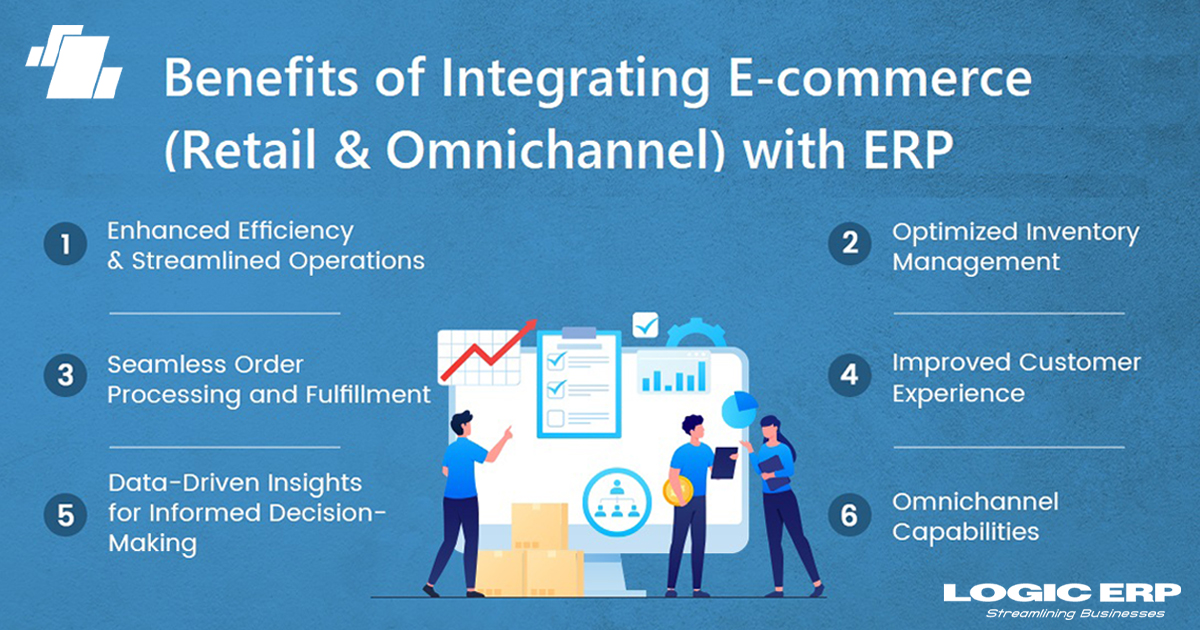

In the ever-evolving landscape of commerce, the integration of Enterprise Resource Planning (ERP) systems with e-commerce platforms has become a game-changer for businesses, especially in the retail sector.
What is ERP Integration in E-commerce?
ERP (Enterprise Resource Planning) integration in e-commerce refers to the process of connecting and synchronizing an ERP system with an e-commerce platform to streamline and optimize various business operations. The integration aims to facilitate the seamless exchange of information and data between the ERP system, which serves as a centralized hub for managing multiple business processes, and the e-commerce platform, which handles online sales and customer interactions.
ERP integration in e-commerce involves linking the core functionalities of an ERP system—such as inventory management, order processing, accounting, human resources, and customer relationship management—with the operations of an online sales platform.
The fusion of ERP and e-commerce, catering to retail and omnichannel strategies, offers many benefits that can significantly enhance business operations, customer experiences, and overall efficiency.
1. Enhanced Efficiency and Streamlined Operations
Integrating ERP with e-commerce brings forth a consolidated approach to managing various business processes. ERP systems are a centralized hub that streamlines operations, combining multiple functions such as inventory management, order processing, accounting, and customer relationship management. When integrated with e-commerce platforms, this synchronization leads to a seamless data flow across the entire business, minimizing errors and redundant tasks.
For retailers, this means that product information, inventory levels, and customer data are automatically updated across all channels, ensuring consistency in product availability, pricing, and customer information. This results in reduced manual data entry, increased accuracy, and improved operational efficiency.
2. Optimized Inventory Management
One of the most crucial aspects of retail and e-commerce is inventory management. ERP systems provide real-time data on inventory levels, which, when integrated with e-commerce platforms, ensures that businesses can accurately track stock levels and manage inventory across various sales channels. This ERP integration enables businesses to implement strategies like just-in-time inventory, prevent stockouts, and better forecast demand, thereby reducing carrying costs and minimizing the risk of overstocking or understocking.
3. Seamless Order Processing and Fulfillment
Integrating ERP and e-commerce enables a seamless order processing and fulfillment mechanism. When a customer places an order online, the ERP system instantly updates inventory records and initiates the order fulfillment process. This integration facilitates automated order processing, reducing fulfillment times and enhancing the overall customer experience.
4. Improved Customer Experience
A vital component of the retail and e-commerce landscape is providing an exceptional customer experience. Integrating ERP with e-commerce platforms enables businesses to provide a unified and consistent customer experience across all touchpoints. Whether a customer makes a purchase in-store, on a website, or via a mobile app, the integrated system ensures a consistent experience by maintaining updated information on orders, shipping, and customer preferences.
5. Data-Driven Insights for Informed Decision-Making
The amalgamation of ERP and e-commerce generates a wealth of data that can be harnessed to derive actionable insights. The integrated system can provide comprehensive analytics and reporting, offering valuable information on customer behavior, sales patterns, and inventory performance. With these insights, businesses can make informed decisions regarding product offerings, pricing strategies, and marketing initiatives, thereby staying competitive and adaptive in the market.
6. Omnichannel Capabilities
In today’s retail landscape, providing an omnichannel experience is imperative. Integrating ERP with e-commerce facilitates businesses in offering a seamless experience across various channels – in-store, online, mobile, social media, and more.
This synchronization allows for features like ‘buy online, pick up in-store’ (BOPIS), unified customer profiles, and consistent pricing and promotions across all channels, ensuring a cohesive and convenient customer experience.
Conclusion
Integrating ERP with e-commerce, whether in the retail sector or following omnichannel strategies, presents businesses with many advantages. From improved operational efficiency to enhanced customer experiences, the synchronization of these systems is pivotal in staying competitive and meeting the dynamic demands of the modern market. As technology evolves, this integration will likely remain a cornerstone for businesses looking to thrive in the ever-expanding digital commerce landscape.

